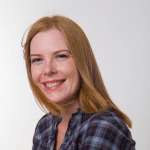Uncategorized
6 min Read
The right path: One family’s education journey

January 30, 2018
Uncategorized
6 min Read

January 30, 2018

“I was on the verge of tears,” says Lavetta Griffin, describing the moment she realized she had finally found the right school for her eldest child.
They were at the school’s curriculum meeting for only 15 minutes when her daughter, Audrey, leaned over and looked at her mother. “She mouthed the word, ‘MOM’.”
“As soon as the founder of the school started talking, I was like, ‘This is her school. This is HER school.’”
Audrey graduated from grade six at a small alternative school in Toronto that’s part of the local public system. But as the switch to middle school approached, Audrey – an A-student who struggles with anxiety that at times affects her attendance – knew she wouldn’t thrive at the much larger mainstream school in her area.
“She can manage her anxiety if she’s in a small environment where she feels familiar and she feels people know her,” says Griffin. “If she’s not in that kind of environment, it’s impossible.”
With far fewer alternative middle schools in the system than elementary, however, there was a bottleneck.
“You’d go to open houses for 30 spots and there would be 200 families.”
Unable to secure a spot at an alternative school, the family was in a bind.
“She was getting increasingly upset, and we were getting increasingly desperate,” says Griffin.
Griffin and her husband, Charlie Clayton, eventually secured a spot for their daughter in a French Immersion program within a big school. But it wasn’t a good fit, either, so Griffin resorted to home-schooling Audrey at the start of grade seven. She says the curriculum was demanding and it felt isolating. “And I’m not a teacher,” she says.
The couple decided they had to look at private schools.
“We didn’t know how much this was going to cost. Could we swing it?”
The couple’s research brought them to that momentous meeting at Voice Integrative School, a co-educational school that Audrey would attend for the rest of grade seven and graduate from in grade eight.
The school had wonderful teachers, Griffin says, and an “amazing” advanced curriculum. When Audrey enrolled in a small alternative high school in the public system for grade nine, she found she had already covered some of the studies. And Griffin says elective courses at Voice Integrative School included things like philosophy.
“Grade seven and eight philosophy? That was awesome. Both of my kids love discourse. They love chewing on ideology.”
Private school had never been part of the plan Griffin and Clayton originally had for their family. Yet they later had to consider it for their younger child, as well.
Last June, 13-year-old Oscar completed grade seven at Toronto’s Dragon Academy. Previously, he had attended the same primary school as his sister, from kindergarten through grade six. Sometimes it was a rough ride there, especially in split classes with the same teacher for grades one and two – years Griffin describes as “not a good teacher-student fit. It took several years to bounce back from that“.
While grade three was better for Oscar emotionally, “academically, they could not give him the support that he needed,” says Griffin, who explains that Oscar has a learning disability when it comes to writing.
“To get written work from him is next to impossible,” she says. “He also is that sort of student, that if the material is of little or no importance to him, he is highly unlikely to pay any attention. Then, he’ll give you a dissertation on why Donald Trump definitely should not be President of the United States, or the history of the DC comic universe starting in 1937 onward. It was like pulling teeth to try to get him to do homework. He just wasn’t focussed. It was a real lost cause.”
“They tried the best they could with the resources that they had, but it wasn’t what he needed.”
So Griffin and Clayton again faced finding a middle school appropriate for their child.
“We knew right away that the school for our catchment would have been 30 kids in the class; he was already struggling with 20 kids in the class that he’d known since kindergarten.”
One of Oscar’s classmates had transferred to a small private school for kids with specific learning disabilities the year before. The child’s mother suggested they talk to the school.
The school founder assessed Oscar. Although she felt he wasn’t a good fit because he didn’t have the learning disability they specialized in, she recommended a short list of five schools for the family to visit.
They settled on Dragon Academy, which Griffin says “he absolutely loves”. She and Clayton have seen a startling turnaround in their son’s academic performance.
“They’re so supportive of Oscar.”
If he’s struggling with something, Griffin says the teachers e-mail right away. “They say ‘look, I’m trying to get this homework done with him, and I’m really not getting his buy-in.’ They say ‘okay, we’re going to try and pick apart at school what exactly he’s struggling with, and then we’re going modify it for him’. They modify stuff all the time.”
Griffin and her husband are amazed at the change in Oscar’s attitude toward his school learning. “Most of the time he does work, we get it back home, it’s mostly correct.” She says he’s gone from hating school “with a passion” to being a B-plus student.
“He was coming home and saying, ‘my favourite subjects are math, English and history’. Now, he’s so conscientious. I won’t pretend that he doesn’t still struggle sometimes to stay focussed and to not be Mr. Jokester in the class. But he cares so much. He wants to do it. All the avoidance stuff that we used to see? Gone.”
She credits the highly-trained teachers at the school and the very small class size.
“There are seven kids in his class. The teachers are on average young, fresh, passionate about education like nobody’s business. And I cannot get over how much they care for every student. It makes all the difference. All the difference in the world.”
Oscar is doing so well at the school, Griffin and Clayton plan to keep him there to complete high school. But she says it means financial sacrifice and sometimes instability.
Clayton wanted to make sure they weighed every solution before resorting to private school, because he felt they just couldn’t afford to pay for it.
Our ‘nest egg’ is not really a nest or an egg. It means one car, we don’t go away on vacation, there’s definitely things like that. My living room chairs are so worn out, it’s embarrassing. But we can’t afford to replace them because we’re spending money in other, more important areas.
“This is the thing that kept coming through my mind: pay now or pay later. And if you pay later, it would set them up on the completely wrong path. Debt? I don’t care. We’re doing it.”